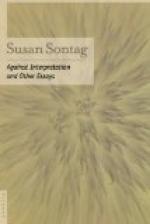|
This section contains 1,486 words (approx. 4 pages at 400 words per page) |

|
Summary
The first essay of Part III takes up on the work of the Romanian-French playwright Eugene Ionesco, both his essays and his works written for the theater. On both counts, Sontag finds the work wanting and she is highly critical of Ionesco's thinness. She is unconvinced by Ionesco's prose writings suggesting that he has been massively misunderstood and finds his "poetry of banality" to be only superficially interesting and, ultimately, vacuous, hackneyed, and clichéd (118). Unlike more rigorous and robust figures, Sontag argues that Ionesco does not have a satisfactory theory for this poetry of banality. What theory is there is merely conceptual scaffolding. "He began with the poetry of banality," she writes, "and then called on a theory to bulwark it" (120). Thus, in Sontag's estimation, the highest possible regard that could be given Ionesco in comparison to figures like Beckett or Genet is...
(read more from the Part 3 Summary)
|
This section contains 1,486 words (approx. 4 pages at 400 words per page) |

|




